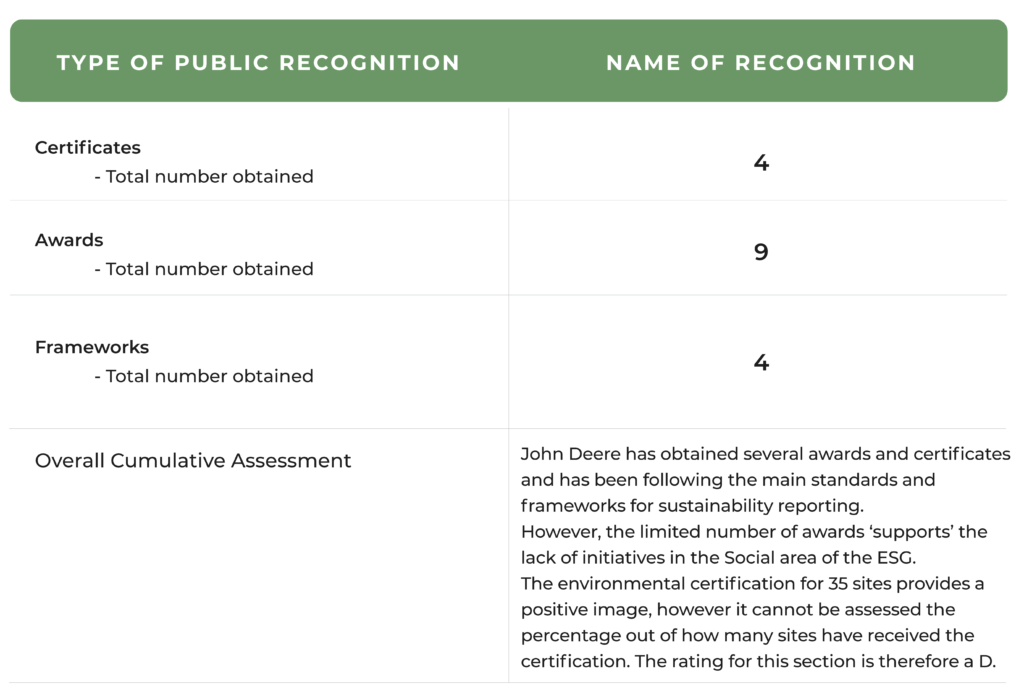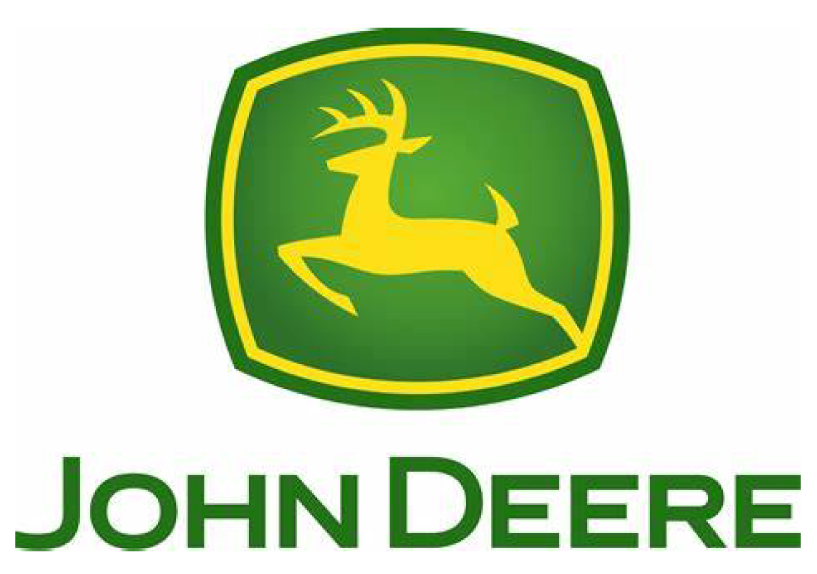
RATING

Neutral
SECTOR
Automotive
Chief Sustainability Officer
Stock Exchange and Ticker
NYSE:DE
Website
www.deere.com
Contact
T: (309) 765-8000
Listing
- Global Reporting Initiative (GRI)
- Sustainability Accounting Standards Board (SASB)
- Task Force on Climate-related Financial Disclosures (TCFD)
- Carbon Disclosure Project (CDP)
- United Nations Sustainable Development Goals (UN SDGs)
Awards
- AE50 Awards 2022
- America’s Best-In-State Employer: #38 in Illinois, #5 in Iowa by Forbes
- America’s Most JUST Companies: #1 for Workers in Commercial Vehicles and Machinery Industry by JUST 100
- Best Global Brands by Interbrand
- Top 5 Best Workplaces for Career Management — India by Great Place to Work
- World Changing Ideas Award by Fast Company
- World’s Most Admired Companies #1 in Construction and Farm Machinery by Fortune
- World’s Most Ethical Companies by Ethisphere Institute
- X9 Combine Awards by iF Design Award and Red Dot Award
Revenue
USD 44.024 billion (2021 Sustainability Report, pg. 5)
Market Capitalisation
USD 120.357 billion
Employees
75,600
Content source
John Deere Sustainability Report
Evaluation of John Deere
Overall, John Deere is rated a D, as there is minimum progress recorded against SDG targets. For a company this size and with such a reputation on the market, it has the potential to be a trendsetter when it comes to sustainability in farming, technology and machinery wise – however, it appears that progress is slow and also hard to measure. Hence, the outlook is neutral with the hope for a robust improvement in the upcoming year.
The John Deere sustainability report is well structured, easy to follow and to identify goals and targets, for the most part. There are goals mentioned however, where no progress was identified, but those goals were not related to sustainability directly and perhaps no progress has been recorded in the period the report was constructed. There are ambitious goals to reduce GHG emissions, but with very little progress. The report was published on February 18, 2022 and contains data from Deere & Company’s fiscal year 2021 (November 2020 – October 2021). The report, nor any data included has been validated by a third party.
Reduction in Scope 1 and 2 is expected through increasing the use of renewable energy sources. Regarding the GHG emissions from Scope 3, responsible for 99% of emissions at John Deere, in the report there is no information on investments, partnerships, nor research into electric vehicles or sustainable fuels linked to goals to reduce emissions from Scope 3. There are articles however, that discuss John Deere efforts to introduce autonomous tractor, create fully autonomous farming by 2030” but no progress is included throughout the report, which gives John Deere a low score regarding sustainability achievements. Product circularity is also a topic of importance and although there are goals in place by 2030 to recycle 95% of the materials (by weight) in John Deers’s products and 65% of the content (by weight) going into John Deere’s machines to be sustainable, no progress has been reported. The Supply Chain is currently under evaluation using the EcoVadis assessment, with no further details reported, except that over 900 logistics, direct material, and indirect material and services suppliers have been asked to complete the sustainability assessment.
Evaluating the Social aspect of the reporting, with critical topics to address such as Diversity, Equality and Inclusion, John Deere is vague about plans to foster such an equal environment, women in different management positions, and in the workforce in general represents less than 20%.
Environmental certification, ISO 14001, has been provided to 23 sites, unknown however the total number of sites, Quality Management certificates for 48 sites, but only 2 sites received Occupational Health and Safety Certification. Moreover, although the company has a goal to reduce by 20% the Total Recordable Incident Rate by 2026, plans to do so include safety-balanced scorecards and self-assessment at all manufacturing units and large parts distribution centers. Some local and industry specific awards have been received by John Deere, but with a minimal impact on the scoring.
Sustainability Scorecard
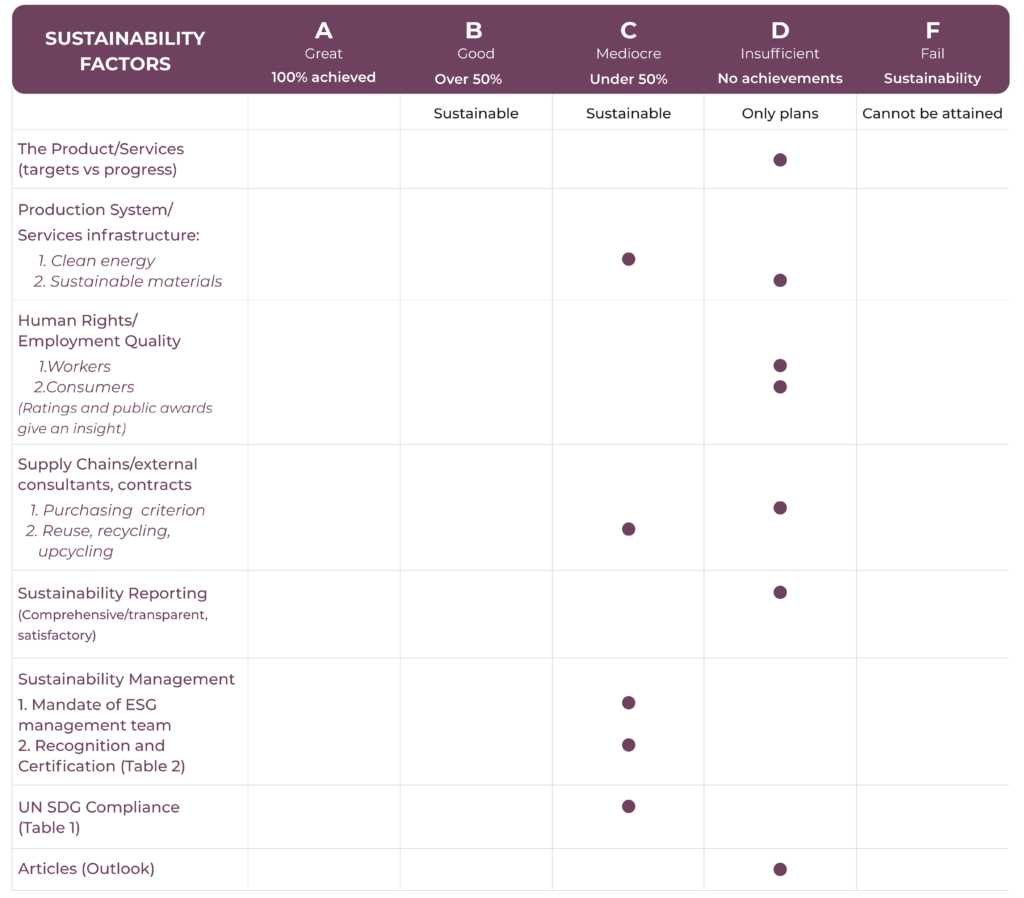
John Deere Company Activity
For 185 years John Deere has led the way in developing innovative solutions to help their customers become more productive. The company produces intelligent, connected machines and applications that are helping revolutionize the agriculture and construction industries.
John Deere’s technology-driven efforts are guided by a single, overarching goal – unlocking customer economic and sustainable value. John Deere ensures seamless access to parts, services, and performance upgrades from take-home to trade-in by providing world class support throughout the lifecycle of their customers’ equipment.
John Deere Sustainability Activity - As per company declarations
Sustainability priorities are set by John Deere as a result of a materiality assessment conducted in 2021. The results also inform sustainability reporting and are considered a framework for evaluating and planning future sustainability goals and objectives. Moreover, together with the materiality assessment, the stakeholders’ engagement also informs the company’s sustainability strategy, in the sense that this is the foundation on which John Deere builds trust and is held accountable by stakeholders.
Among the highest-priority topics identified in regard to environment are Climate Stewardship, Emissions and Energy, Soil Health, Sustainable Food and Agriculture and others; in regard to social, Diversity, Equity, & Inclusion, as well as Employee Health, Safety & Wellness and lastly, related to governance, focus is set on New Technologies & Innovations and Urbanization & Sustainable Infrastructure. A separate category of topics, labeled “For Active Management and Monitoring”, include among others Dealership Talent, Product Quality, Durability & Reliability, Traceability, Nutrition, & Sustainable Diets, Human Rights & Labor Relations, Responsible Supply Base & Sourcing etc.
John Deere wants to position itself as to deliver economic and sustainable value for customers through intelligent, connected machines and applications that will revolutionize production systems in agriculture and construction.
The company has introduced the Leap Ambitions as ways to measure the success of this new strategy and which includes goals designed to boost economic value and sustainability for their customers. The company is committed to achieving these goals with four-year (2026) and eight-year (2030) periods.
Certificate & Labels, Standards and Frameworks
ISO 14001: Environmental Management (35 sites certified)
ISO 9001: Quality Management (48 sites certified)
ISO 45001: Occupational Health and Safety (2 sites certified)
EcoVadis Outstanding Program Leadership Award – Sustain 2022
John Deere in the news: Press Reviews and Social Media
John Deere’s innovations for sustainable farming have been recognised. However, they have certain negative articles that question their credibility.
https://www.greenbiz.com/article/what-does-deeres-fully-autonomous-tractor-mean-sustainability-agriculture (positive):
This article explains about the fully autonomous tractor developed by John Deere for sustainable farming.
https://www.cnbc.com/2022/10/02/how-deere-plans-to-build-a-world-of-fully-autonomous-farming-by-2030.html (Positive):
This article also explains about the company’s autonomous tractors. Moreover, it also explains about their partnerships and acquisitions.
https://news.mongabay.com/2022/02/john-deere-and-brazilian-bank-team-up-to-equip-farmers-deforesting-the-amazon/ (Negative):
This article points out the fact that John Deere and Brazilian bank teamed up to equip farmers that were responsible for Amazon deforestation.
https://www.ifixit.com/News/62788/john-deere-has-been-violating-the-clean-air-act-by-restricting-repair (Negative):
The Repair Association and the US Public Interest Research Group (PIRG) has reported that John Deere appeared to have been violating the Clean Air Act, and are calling on the Environmental Protection Agency to investigate Deere’s misrepresentations regarding the capability to perform repairs on the emissions controls on the company’s equipment engines.
Although in the application to certify the engines with the Clean Air Act, John Deere has promised that manuals include details such as “a repair shop or a person of the owner’s choosing” can fix the emissions controls, the vast majority of manuals, don’t and therefore Deere requires owners to come to a dealer dor emissions repairs. When Deere engines need emission control repair, all functions are disabled, except those needed to get the equipment out of the way. Furthermore, only dealers can enable back all functions, but in some areas, one Deere dealership can service 2,300 farms which can create long repair lines.
A research into the Deere Operator’s Manuals, some from decades ago has brought to light evidence that Deere appears to have lied, to both farmers and to the EPA on the specific requirement of the manufacturers of nonroad diesel engines that are required to include “that a repair shop or person of the owner’s choosing may maintain, replace, or repair emission-control devices and systems”, which obviously Deere failed to include in their manuals, and only rely on the dealership service.
Highlights from John Deere Sustainability Report
- Increase of percentage of women in Global Management Position from 2020, more females overall in the workforce
- Increase of non-white employees in US Management from 2020
- 27.8 million+ pounds of material recycled through remanufacturing
- Launched the following sustainable innovations:
- See & Spray Select System
- Integrated ExactRate Liquid Fertilizer Solution
- CH950 Sugar Cane Harvester
- C770 Cotton Harvester
- USD 42.5 million community investment
- 20% reduction in scope 1 and 2 GHG emissions achieved since 2017
- 4% reduction in scope 1 and 2 GHG emissions achieved in 2021
Weaknesses and Setbacks
- Considering that 97% of their GHG emissions comes from Scope 3, there are no goals or actions identified in reducing them
- The company’s focus is rather on developing products for customers to mitigate climate change and other risks, rather than taking internal actions
- No social goals have been identified
- The Deere & Company Board of Directors oversights sustainability related topics, as well as over the risks and opportunities associated with climate change
- The Corporate Governance Committee review ESG topics quarterly
- The compensation committee is ensuring the compensation is aligned with strategic priorities, performance and opportunities of the company
Targets vs Progress Reported
| Target | Results reported |
|---|---|
| Reduce operation GHG emissions (from Scope 1 and 2) by 15% (2017 baseline year) by using 50% renewable-energy supply by 2022 | - In 2021, John Deere achieved 20% reduction in GHG emissions (2017 baseline) and 40.5% renewable energy - Scope 1 GHG emissions in 2021, 403,300 metric tons - Scope 2 GHG emissions were 407,700 metric tons in 2021 - More than 40 energy-efficient projects globally: lightening and controls, compressed air, manufacturing processes, “greening” the energy supply, employee focus on eliminating energy waste |
| Proposal to reduce further operational GHG emissions by an additional 50% (2021 base year) submitted for approval to Science Based Targets | Focus on energy efficiency by continue to develop onsite renewable solutions and off site partnerships for renewable projects |
| Commitment to submit a plan for 30% reduction in Scope 3 GHG emissions by 2030 to the Science Based Targets initiative |
- Scope 3 emissions represent 99% of the overall GHG emissions, with 92% deriving from category 11 (Use of Sold Products), the rest from category 1 (Purchased Goods and Services) - In 2021, Scope 3 GHG emissions were 112,453,000 - Plans to reduce GHG emissions from Scope 3 include: - Commitment to develop products, technologies, and solutions to reduce the emissions of the products produced, nothing to measure - Plans to invest in R&D for machine propulsion, including electrification, renewable fuels and biofuel, but nothing concrete to report on |
| Reduce environmental impact, including CO2e emissions, on 90% of new product programs | 71% of new product programs in 2021 incorporated goals to lower environmental impact |
| Increase by 30% remanufacturing revenue from a 2017 base year | - 16.3% sales growth of remanufactured and rebuilt products |
| Commitment that by 2030: - 95% of the materials (by weight) in John Deers’s products will be recyclable - 65% of the content (by weight) going into John Deere’s machines will be sustainable - 50% increase in the remanufacturing revenue |
- No specific progress can be tracked, other than that John Deere strives to improve productivity, enhance fuel efficiency, reduce material usage, increase sustainable-material usage, and design for remanufacturing - The products incorporate various sustainable materials such as recycled content, renewable materials and low-carbon materials - Innovate to extend the product life cycles: performance upgrades, rebuild, and remanufacturing |
| Reduce water intensity by 10% at water-stressed manufacturing location by implementing best management practices | In 2021, 80% of the best management practices have been implemented in the facilities experiencing water-scarcity |
| - Recycle 85% of total waste by 2022 - Reduce waste intensity by 15% by 2030 |
In 2021, John Deere recycled 83% of their total waste through waste-management programs: - Guidance to increase recycling - Work with approved suppliers to ensure the separated waste is recycled or reused - Steel and scrap metal not included within the waste reporting, they are however recycled through the resale process |
| By 2026, Ensure 100% of new Small Ag equipment is connectivity enabled | No progress identified |
| By 2026, Offer an electric option in each Turf and Compact Utility Tractor product family | No progress identified |
| By 2026, Deliver a fully autonomous, battery-powered electric ag tractor to the market | No progress identified |
| Deliver 20+ electric and hybrid product models by 2026 | No progress identified |
| Earthmoving: Increase SmartGrade™ grade control adoption to 50% by 2026 | No progress identified |
| Forestry: Boost Intelligent Boom Control adoption to 100% by 2026 | No progress identified |
| Roadbuilding: Increase Precision Roadbuilding Solutions adoption to 85% by 2026 | No progress identified |
| Supplier diversity focus by 2025: - Spend $500 millions with minority-owned business - Spend $1 billion with woman-owned businesses - Actively grow the relationships with other disadvantaged business enterprises (DBEs) |
The company is working on growing these kind of relationships, identify diverse suppliers and developing an equitable onboarding process: - In 2021, expanded the supply base of small woman-owned businesses by 175 percent to nearly $4 million - Expanded the small disadvantaged (minority-owned) suppliers by over 200 percent to over $14 million in spend |
| Reach over 1,000 suppliers by the end of fiscal year 2022, (over 60% of total material spend) to assess and improve suppliers’ performance | Over 900 logistics, direct material, and indirect material and services suppliers have been asked to complete the sustainability assessment, but no results have been published in regard to how these suppliers perform |
| Achieve 20% reduction in Total Recordable Incident Rate by 2026 | - Number of recordable incidents per 100 employees was 1.68 in 2021 - Safety-balanced scorecards to drive continuous improvement - 75% of all in-scope units are achieving targeted levels of performance - In 2021 John Deere established standard ergonomics product requirements and performed self-assessments at all manufacturing units and large parts distribution centers: no further details on the results of the assessments |
UN SDGs Compliance Analysis
Progress made toward SDG targets
As reported by John Deere
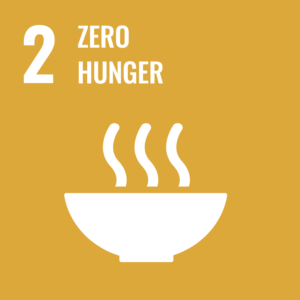
- The single machine CH950 provides customers in the sugar cane production business with numerous sustainability benefits such as fuel efficiency, soil health and reduced GHG emissions.
- See & Spray™ technology to significantly reduce contact herbicide usage

- Employee Resource Groups (ERG) company-sponsored, employee-run organization founded to focus on employee development, community involvement and business alignment
- Availability of microlearning courses that cover topics such as unconscious bias, psychological safety, and empathy, and look to educate and inspire employees to grow in their DEI know-how
- “United for Equity” programs, a 21-day challenge to keep the DEI conversation moving, assigning an employee champion to hold regular meetings and to keep interaction topical, educational and engaging
- Percentage of women in various positions in 2021:
- Board of directors: 33.3%
- Senior Management: 14.7%
- Management: 21.2%
- General workforce: 19.8%

- $42.5 millions invested in communities around the world
- $2.7 million invested in Food- Banking Systems to serve 12.8 million meals in 2021, equal to over $32 million in economic relief to those most vulnerable in home communities
- $3.4 millions invested in 1.4 million farmers
- 124,000 volunteer hours, which means that John Deere employees created over $3 million of additional value within U.S.-based communities
- Implement two Recruiting Process Outsourcing (RPOs) models with a focus on diversity, quality and speed
- Robust rotational program for employees joining John deere right after college
- Offer functional and leadership learning tools
- Invest in targeted development
- Employees at all levels are provided with 100% of tuition cost and books as they decide to continue their formal education and to acquire critical skills to address future challenges
- Several other program such as “Technical Path”, “People Path” employees are encouraged to become subject matters and use their acquired skills to enable John Deere “to fulfill its higher purpose”
- John Deere TECH Program and Military career Skills Program in the US, where participants are provided with support in the form of scholarships, paid internships, tools, training, and advertising

- Performance Upgrades to Promote Sustainability, where customer can add technology and components to extend the life of the products and improve performance

Understanding soil-carbon management and carbon sequestration:
- In 2021 John Deere started a carbon pilot program to help customers beyond crop yield, to review the agronomic benefits of carbon capture and potentially earn carbon credits using the information collected by John Deere at more than 315 million engaged acres globally
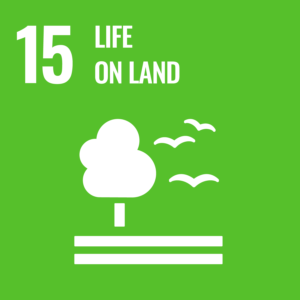
TimberMatic Maps, a GPR technology for Sustainable Forest Management that enables contractors to monitor all locations and track tree placement, without disrupting the environmentally sensitive areas

Allow retailers access to sustainable practices used by cotton growers in the Cotton Trust Protocol
Sustainability Certificates, Awards and Listings
